It is afternoon on a small, remote oil palm plantation in Jambi, Indonesia. Together with visitors from other various international organisations, I am taking shelter from the sun, standing under some towering palm trees and wearing a hard hat. Our shoes let out soft squelches as they shift on a carpet of damp husk-like residue, that is the remnants of palm fruits already harvested for their main use – their edible oil.
To continue reading, subscribe to Eco‑Business.
There's something for everyone. We offer a range of subscription plans.
- Access our stories and receive our Insights Weekly newsletter with the free EB Member plan.
- Unlock unlimited access to our content and archive with EB Circle.
- Publish your content with EB Premium.
We are on a trip facilitated by the Roundtable on Sustainable Palm Oil (RSPO), the region’s leading certifier for palm oil that is responsibly and sustainably sourced, and the Indonesian Sustainable Palm Oil Farmers’ Forum (Fortasbi). They have arranged for us to speak with Jambi’s smallholder farmers and take a closer look at how the province’s growers have managed to adopt what both organisations say are more innovative and regenerative practices, partly with the support of additional income from RSPO’s smallholder credit mechanism.
Imron Rosjidi, one of Jambi’s many palm oil smallholders who benefits in part from the credit system, is showing us around the two-hectare plantation which he owns and manages. What we are stepping on, known as empty fruit bunches (EFBs), are often treated by local smallholders as waste. But Rosjidi has chosen to apply the material as fertiliser, which he gets for free from nearby mills since it is discarded after oil palm is processed.
Rosjidi’s distribution of the mulch around the bases of the palm trees is a method that draws from how larger plantations use EFBs as organic fertiliser. Unlike those sites, however, the EFBs on Rosjidi’s plantation are piled up near the base of the trees instead of being apart between each tree.
This method nourishes the roots of the trees which have been damaged due to extensive use of chemical fertilisers and a long drought that had begun in June this year, exacerbated by El Niño weather conditions, said Rosjidi. Furthermore, although it is not visible at the time of our visit, Rosjidi explained that edible mushrooms will soon sprout across the EFB layer, given that the plantation had just seen a drizzle early in the morning. During peak rainy season, which is approaching, the mushrooms are harvested as often as twice a day, he shared.
Rosjidi is one of 349 members of Asosiasi Petani Berkah Mandah Lestari (APBML), a Jambi-based smallholders association whose members collectively received RSPO certification for producing sustainable palm oil in 2019, and which also raises additional revenue via the sales of RSPO credits. Small-scale land ownership gives him more flexibility to innovate, and according to Rosjidi, his non-conventional methods supported by APBML have paid off. Since he started using organic fertilisers and adopted alternative agricultural practices in 2019, the yield on his plantation has nearly doubled from about 17 tonnes of palm oil per month to as much as 30 tonnes.
“In the beginning, our palm fruits were dry and not worth much. After using organic fertiliser, we saw big changes in the quality of our palm fruits,” he said, while speaking to the visiting group, which also included global representatives from RSPO, as well as procurement and sustainability executives from palm oil-buying consumer goods companies in Europe and Japan.
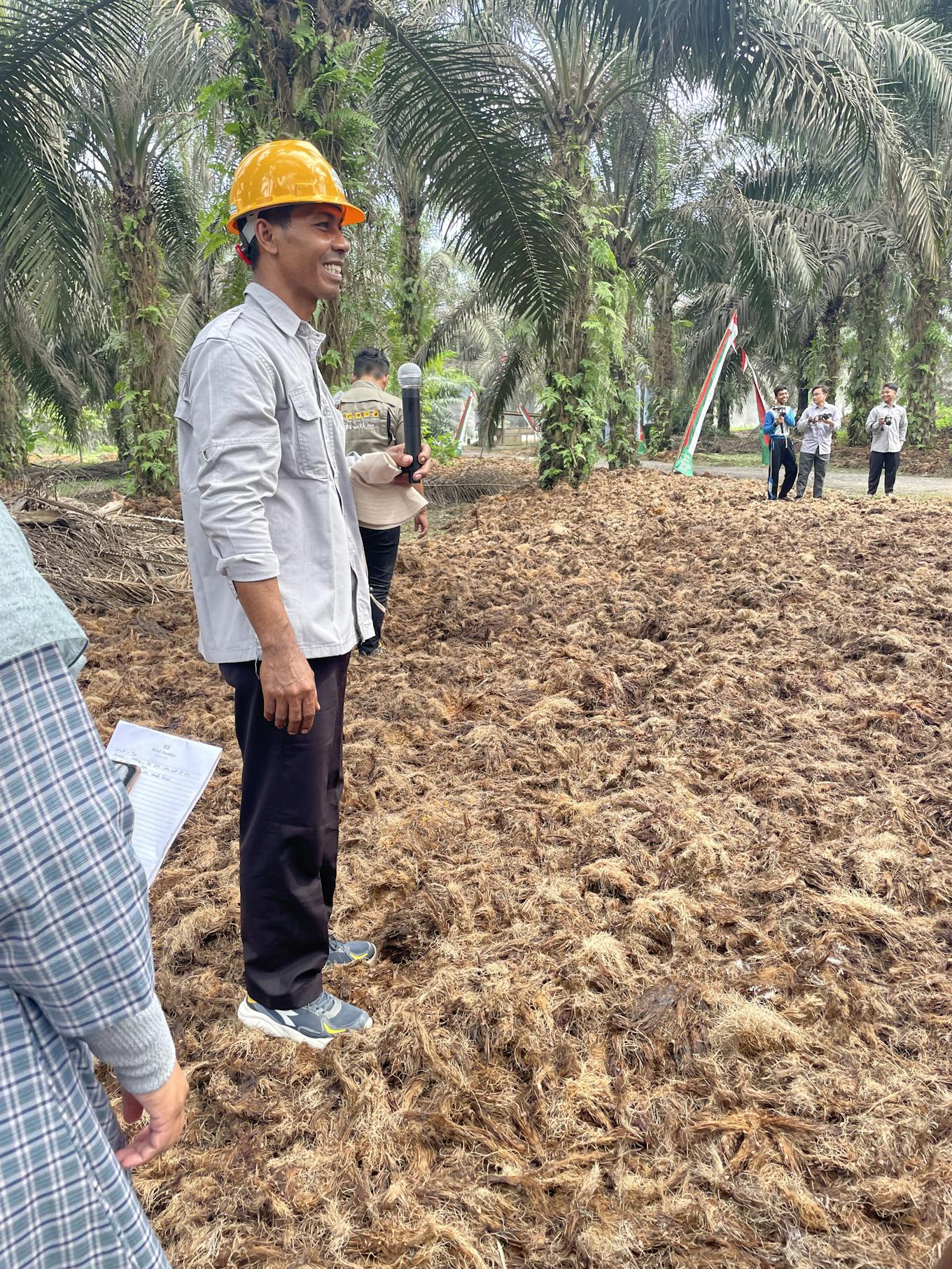
Imron Rosjidi, a palm oil smallholder, stands on the empty fruit bunches used as organic fertiliser on his oil palm plantation in Jambi. During the rainy season, mushrooms grow and are harvested twice a day on the fertiliser, which are cooked and sold. Image: Samantha Ho / Eco-Business
EU deforestation law’s trickle-down effect
Rosjidi’s mushroom harvest – a product of his ingenuity and which has been commercialised to be sold daily for an extra income of about 300,000 rupiah (US$20) for cooking and other uses – is what surprises those familiar with the industry. Bella Sosa, a visitor who hails from Honduras and is the Latin America smallholder manager for RSPO said: “I’ve never seen this being done before.”
On a wider scale, the revenue APBML has raised via the sales of RSPO credits since its certification – about 1.6 billion rupiah (US$103,967) – has gone towards supporting local environmental and social causes such as the establishment of a conservation area surrounding Sungai Asam, a river located in the northern part of Jambi.
The one-kilometre site has been under protected status since 2021. Fishing and garbage dumping are banned, and APBML is also replanting native fruit trees along the river banks, which had previously been cleared for palm oil cultivation. The initiatives are rooted in a practice known as lubuk larangan, which translates to “forbidden pit” but refers to demarcating part of a local river based on community agreement not to disturb the river ecosystem, such as fishing in the zone for a certain period. It has its foundations in traditional Sumatran practices which have been recently revived and according to academics, stem from a cultural appreciation for community and local knowledge.
“We plant fruit trees instead of hardwood trees because we want to rehabilitate the area for animals such as monkeys,” said APBML group manager Ardiansyah. “We have destroyed the natural habitats by planting oil palm trees, so now we need to feed the animals.”
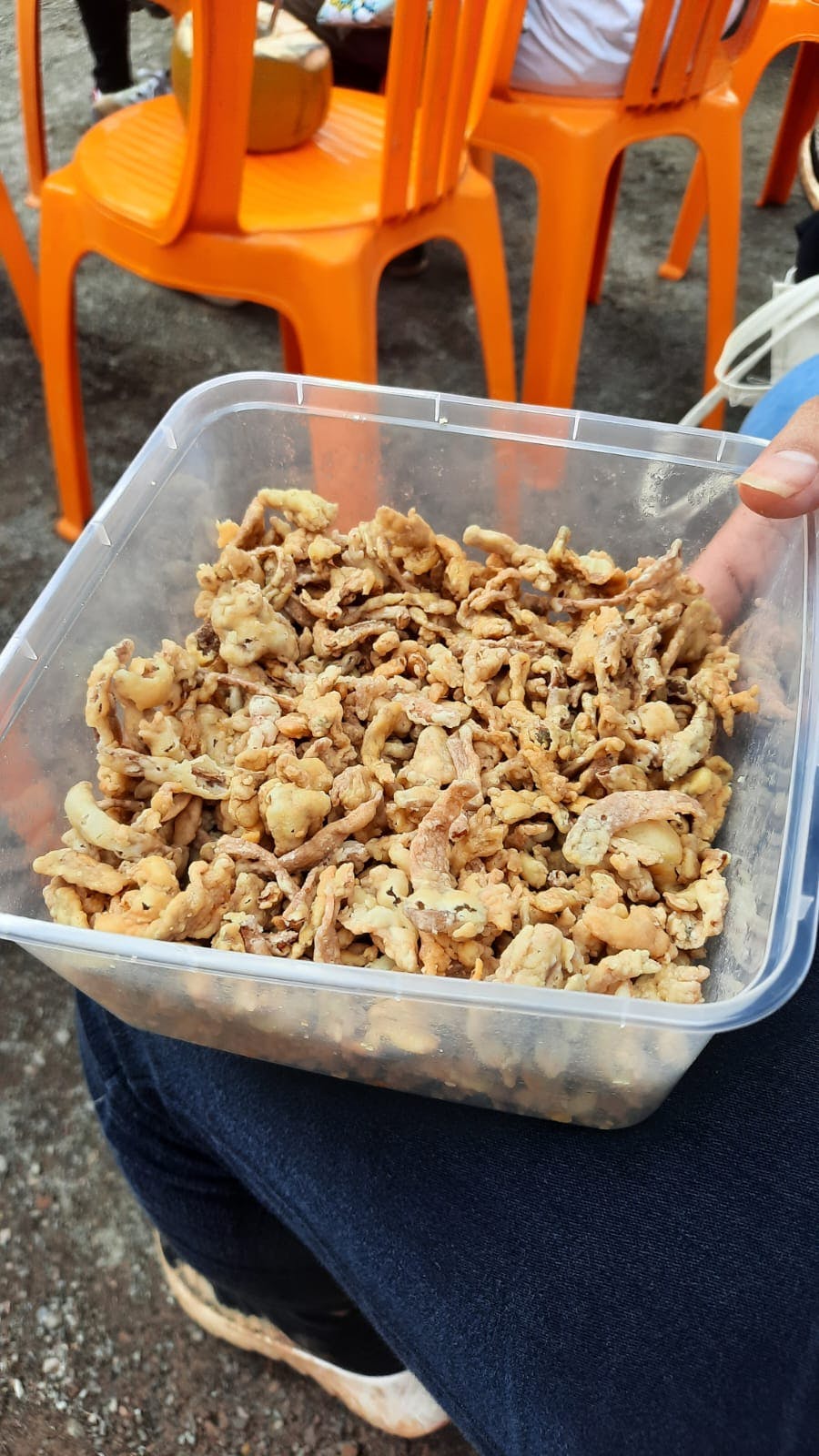
Mushrooms, grown on empty fruit bunches on Imron Rosjidi’s small plantation in Jambi, Indonesia, were fried as a crispy snack. Image: RSPO
Saplings planted on the site, which range from coffee and candlenut to guava and petai (bitter bean), are grown by a local group of women nursery managers. They have sold more than 4,500 trees to smallholder associations like APBML and social forestry farmers, raising over US$920 over the past few years. APBML also supports the women-led eco-printing business, in which locally sourced leaves and natural dyes are used to create patterned fabrics.
Another RSPO-certified smallholder group, Forum Petani Swadaya Merlung Renah Mendaluh (FPS-MRM), recently celebrated the reopening of their own lubuk larangan in western Jambi after a five-year ban on fishing and pollution, but there are now concerns of disruption if demand for sustainable palm oil credits fall and in turn impact on financial support that is vital to sustaining these conservation efforts.
Guntur Cahyo Prabowo, head of smallholders for RSPO, in an opinion piece recently penned, writes that there is the risk of diminishing incentives for buyers to purchase Independent Smallholder (ISH) credits with the impending enforcement of the European Union Deforestation Regulation (EUDR), since the physical suppply of palm oil can now be proven to be compliant with the new anti-deforestation rules.
This means that buyers could exclude smallholders with no access to certified mills or other means to prove compliance, argued Prabowo. “While there other ways to support smallholders, ISH credits are a proven, practical and well-targeted method of providing economic relief and inclusion in the sustainable production model,” he said, stating that if companies decide that the mechanism isn’t worth the investment, then smallholders will suffer.
“Since smallholders represent such a significant amount of palm oil production, their exclusion could slow progress towards global environmental goals.”
In Jambi alone, of the 1.15 million hectares of oil palm plantations in Jambi, more than 600,000 hectares are owned and managed by smallholders.
Ardiansyah also worries that strict requirements for sourcing palm oil under the EUDR would affect conservation efforts and the earnings of smallholders across the country.
“We are afraid that with the onset of EUDR, Indonesian oil palm farmers will fall below the poverty line,” said Ardiansyah, who adds that the lives of Jambi’s families have significantly improved today with the proceeds from selling sustainable palm oil credits, with some being able to afford to send their children to study in the capital city of Jakarta, which is regarded as a mark of progress. This should not be reversed, he said.
Credits: a temporary solution
Under the EUDR, all buyers of agricultural goods imported into Europe must prove that the imports do not originate from recently deforested land. This involves ensuring that palm oil is traceable along the supply chain, from providing the coordinates and geospatial data of source plantations, to showing proof of legal land use and ensuring that the palm oil processing mills only process deforestation-free fresh fruit bunches (FFBs).
RSPO already requires geolocation data from its certified smallholders to prove that their products are deforestation-free. However, smallholders are not always able to sell their harvested FFBs to certified mills, either due to these mills being too far from their farms or because at times, the daily price offered by uncertified mills is higher. Smallholders across Indonesia face this price mismatch, I learnt at a smallholder event in Jakarta held on the sidelines of RSPO’s annual conference in November.
Rukaiyah Rafik, head of secretariat for Fortasbi, said that while the credit mechanism is not ideal — buyers would ideally buy sustainably grown palm oil directly — RSPO credits have been crucial in supporting sustainable production efforts by smallholders.
“Credits are a temporary solution,” Rafik told me. She described it as a mode of transaction for sustainable palm oil by proxy, before infrastructure and systems can be established to support physical trade.
To that end, Fortasbi is collaborating with American food manufacturer Cargill to facilitate the purchase of FFBs directly from smallholders, using RSPO’s preserved and segregated palm oil scheme. “We need the willingness of corporate buyers for this to be achieved,” she said.
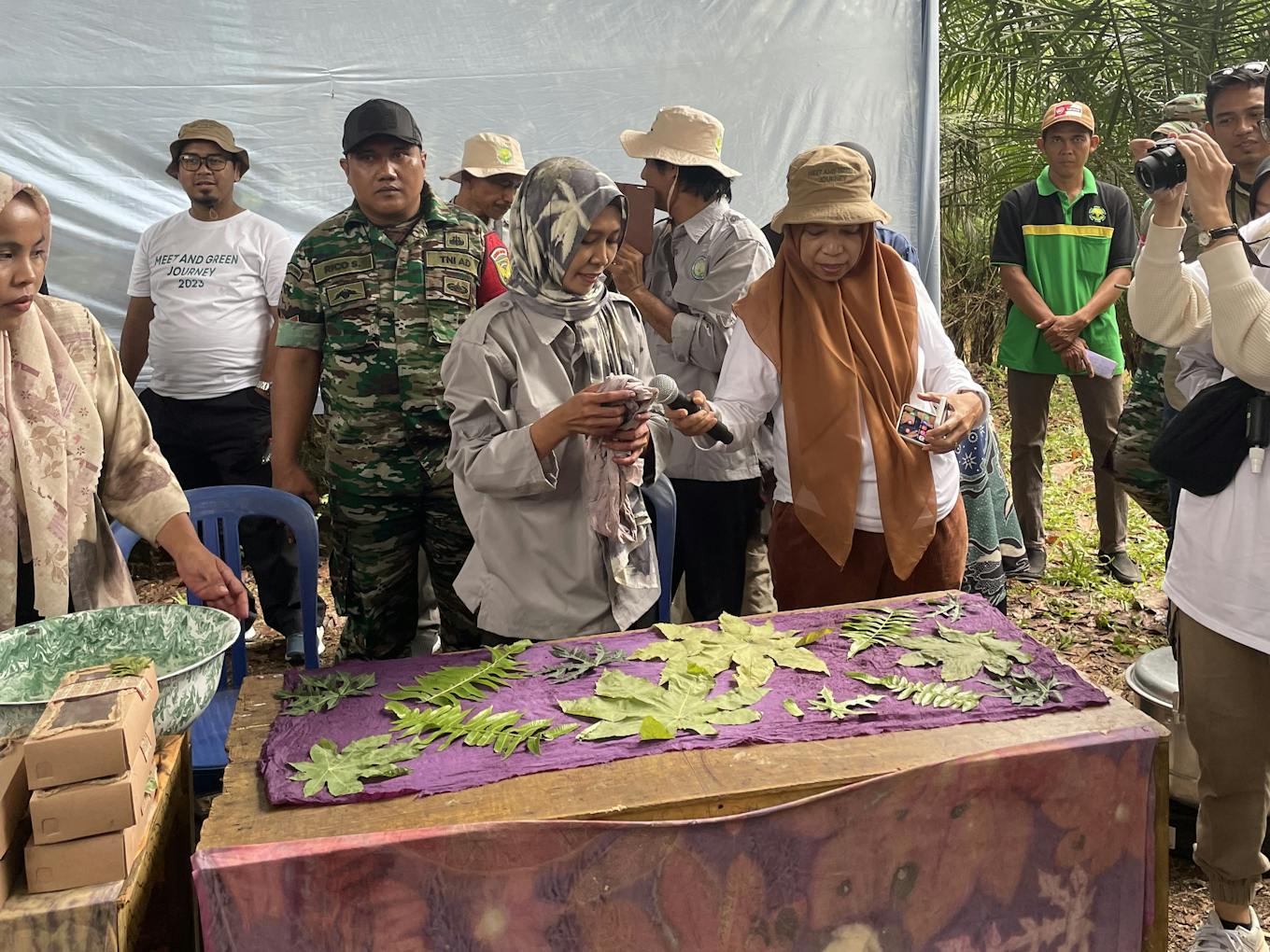
Susi Wahyuni, a member of APBML, (left) demonstrates how native plants are used to dye and decorate shawls, a technique known as “eco-printing”. She is accompanied by Rukaiyah Rafik, head of the sectretariat at sustainable palm oil non-profit Yayasan Fortasbi Indonesia (right). Image: Samantha Ho / Eco-Business
Local government support
Jambi’s local government acknowledged that it also has much to do to improve infrastructure and connectivity to grow sustainable palm oil production, even as it strives to reshape Jambi’s image as a hotspot for forest and peatland fires into one that pioneers and leads on sustainable agriculture efforts.
Forest fires in Jambi have led to transboundary haze pollution, affecting air quality in Singapore and Malaysia. During previous El Niño cycles, which peak once every three to four years and was last at its worst in 2015 and 2019, Jambi was among the regions with the most hotspots and unhealthiest air quality detected. The origins and management of transboundary haze has been a source of disagreement between Southeast Asian countries.
Traditional slash-and-burn techniques used by smallholders to clear their land have been villainised in the media, but Indonesian sustainability advocate Aida Greenbury argues that this blame has been misplaced. She said that large companies have encouraged this narrative to deflect criticism for their draining of peatlands for palm oil plantations.
In Jambi, smallholders under APBML currently do not deforest or clear their land using burning techniques, and none have experienced haze over the past year, Ardiansyah told me.
In fact, the practice of slash and burn has been banned as a form of land clearing in the province. On the trip to Jambi, I spotted large billboards erected along main roads that warn against using this technique We were also informed that the local government has offered to subsidise the use of alternative methods to help small-scale landowners and farmers.
“This year, we have assisted smallholders who want to clear land using heavy machinery instead of burning,” said Agus Rizal, head of Jambi’s plantation agency. The local government also encourages the farming of different crops instead of palm oil monoculture, by handing out seedlings for crops such as coffee and cinnamon, he said.
However, errant companies in Jambi have paid locals to covertly start fires for land clearing even though any form of open burning is illegal, locals told me. Arrests have been made in recent months in relation to suspected involvement in forest fires.
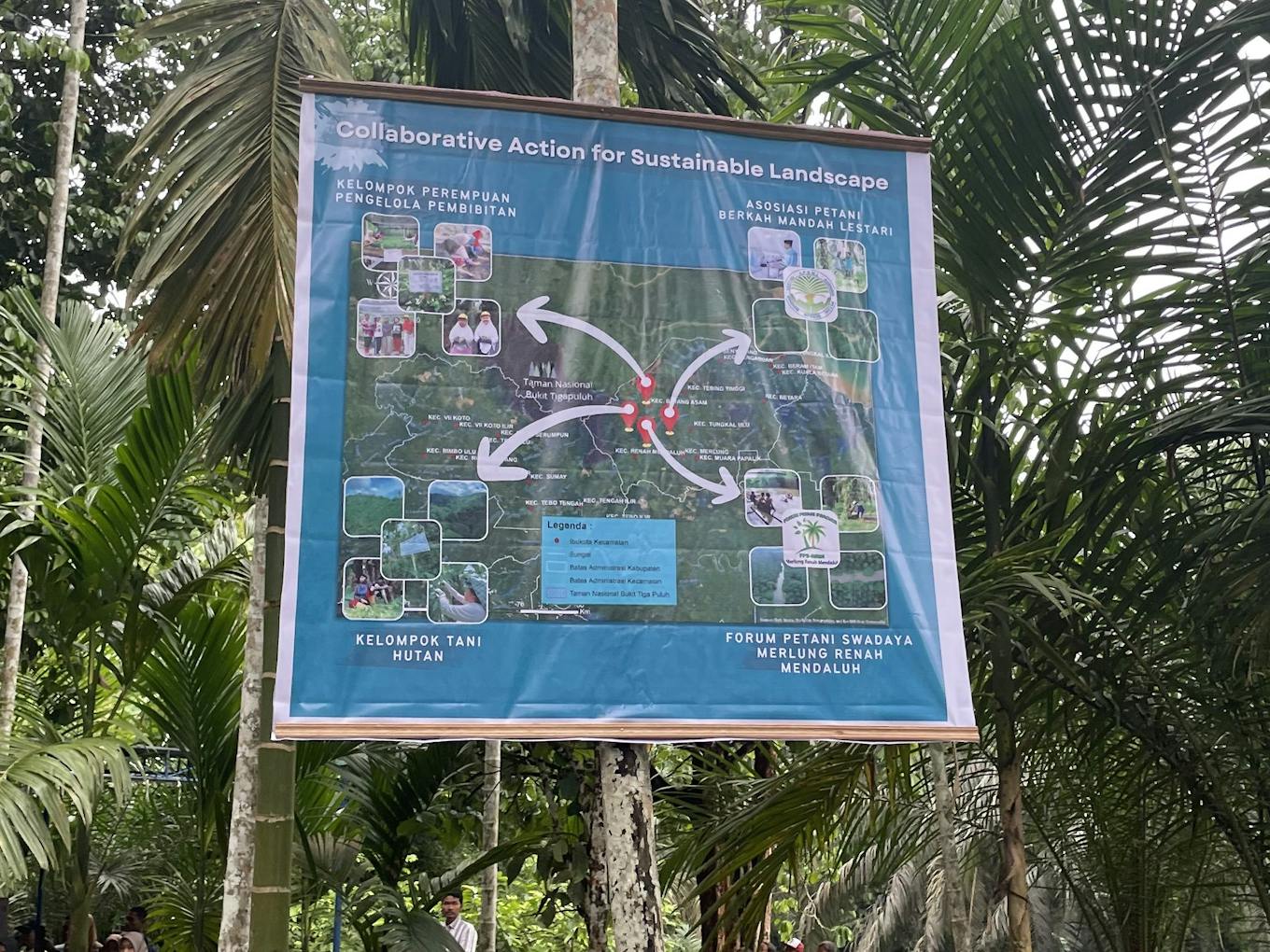
A map shows the different social forestry and sustainable palm oil smallholder groups that are working together on the edge of the Bukit 30 National Park in Jambi to restore riparian and riverine habitats. Image: Samantha Ho / Eco-Business
To address issues like these, Jambi’s government has increased patrols and monitoring of potential hotspots. “We have identified four districts that are at the highest risk of forest and land fires,” said Jambi regional secretary H Sudirman. Preventive efforts include the use of satellite technology to detect hotspots early, increasing the number of patrols and rotating watchguards between different locations on a monthly basis, he added.
“There is no technology that can stop the fires [once they have started] and at those times, we can only pray for rain, but we are actively taking precautionary measures [to prevent fires in the first place],” Sudirman said.
Rizal added that the local government is focused on convincing the global market that Jambi is “fully committed to implementing sustainable plantation practices”, including the protection of forested lands. According to Rizal, Jambi is home to 2.1 million hectares of natural forests, much of which is protected as part of national parks. Much of these parks extend into neighbouring provinces and at least one of the protected forests is home to the Indigenous Suku Anak Dalam tribe.
“To grow the palm oil industry, we are helping communities develop palm oil plantations outside forested areas, by providing sponsorships and assistance for fertilisers, as well as building roads to improve transportation and connectivity,” he said.
The government is also working on building an inventory of smallholders in Jambi, which will include geolocation and legality data as required by international regulations such as the EUDR.
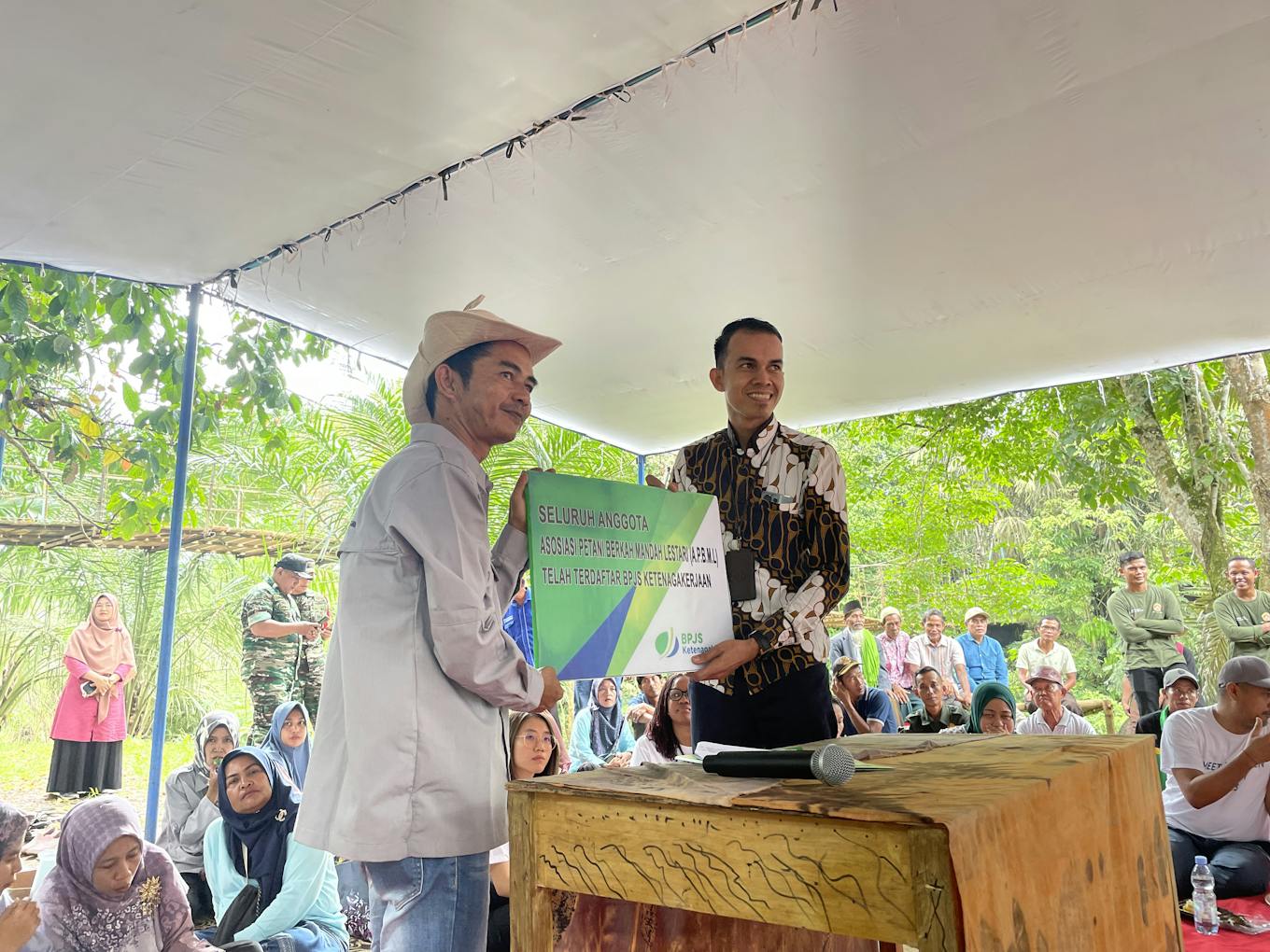
Ardiansyah, group manager of the sustainable palm oil smallholder group APBML (left), smiles after signing an agreement with Indonesian social security BPJS Employment to cover workers on small-scale oil palm farms in Jambi. Image: Samantha Ho/ Eco-Business
At the national level, the Indonesian government has mandated that all palm oil growers apply for certification under the Indonesia Sustainable Palm Oil (ISPO) sustainability certification scheme. Compared to the RSPO scheme, ISPO has stricter rules requiring producers to prove legal land ownership.
Smallholders have a deadline of 2025 to secure ISPO certification, although many argue that they need more financial and administrative support to meet the requirements, including help with the preparation of legal documents.
To help these smallholders, Rizal said that the Jambi government has leveraged the BioCarbon Fund, backed by the World Bank and distributed under the Jambi Sustainable Landscape Management Project. Via the fund, the administration has helped secure registration letters for all plantation and cultivation businesses this year, he said.
“These are our initiatives to ensure that Jambi-produced palm oil is fully legal and suitable for export under the EUDR,” said Rizal.
Jambi smallholders, too, are eager to demonstrate that palm oil sourced from their plantations are deforestation-free and meet global sustainability standards.
“We hope that the international community can help us convince the global market that we are ready to meet (their demands for) sustainable palm oil,” said Ardiansyah.
Eco-Business’ access to smallholders and local government officials in Jambi, as well as the sponsored trip to Jakarta and the plantation site, was facilitated by RSPO and Fortasbi.
Correction note (4 Jan 2024): An earlier version of the article stated that the women nursey managers had raised US$260 million over the past few years in sales and that the revenue is used as start-up capital for other businesses. The actual figure should be US$920 and proceeds from the seedling sales do not directly support its eco-printing business. It also misstated the total tree cover in Jambi. These have been corrected. We apologise for the errors.











